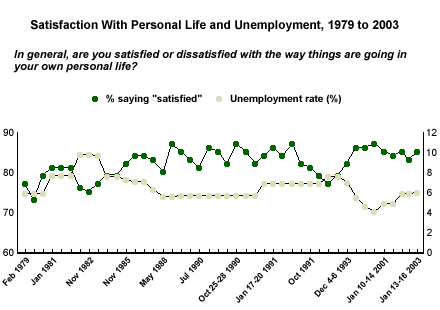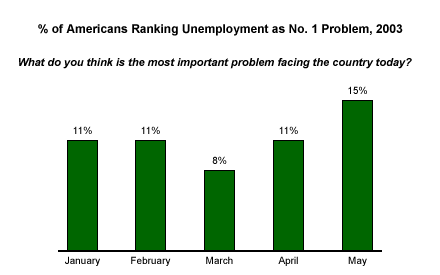Gallup has been asking the question "In general, are you satisfied or dissatisfied with the way things are going in your own personal life?" in its polls since 1979. In asking people to rate their satisfaction with their personal lives, we obtain a measure of their happiness -- referred to in the behavioral sciences as "subjective well-being."
A comparison of Gallup's measure of subjective well-being and the U.S. unemployment rate since 1979 validates what happiness research around the world is telling us -- aggregate unemployment rates are related to Americans' average levels of happiness. There is abundant psychological evidence that a person's ability to find work and feel productive is one of the most important determinants of his or her happiness, and we found the two variables to be correlated over the 24-year period studied.

On the Mind of the Nation
The unemployment rate has climbed to 6.1%. In a May 2003 Gallup Poll, 15% of Americans said that unemployment is the most important problem facing the nation today, compared to the 8% who ranked unemployment as the most important problem two months earlier in March 2003. The impact of a jobless recovery on the morale and the mood of America is sure to be overwhelming and is something for which policy-makers should be prepared.

Underemployment -- More Than Just a Market Failure
But unemployment isn't the only symptom of a lackluster economy plaguing American workers. There is also the concept of underemployment, which describes workers who aren't employed in their desired capacity, whether in terms of the number of hours worked or underutilization of their skills and experience. In some cases, underemployment is related to what Gallup refers to as disengagement.
Actively disengaged employees do not identify with their work or actively promote company objectives. And beyond the economic inefficiencies underemployment presents, there is a higher price to be paid in the dissatisfaction that actively disengaged workers feel in their personal lives. A recent Gallup employee engagement survey* found that while 65% of engaged employees said they were extremely satisfied with their personal lives, only 24% of actively disengaged employees were able to say that they were extremely satisfied with their personal lives.
Bottom Line
The jobless recovery has deeply affected both the subjective well-being of unemployed and disengaged workers and the nation's morale in general. In studying the true impact of this recession, policy-makers would be well served to look beyond economic indicators to indicators of happiness as well.
*Results of this survey are based on a nationally representative sample of about 1,000 employed adults aged 18 and older. Interviews were conducted by telephone during October 2000 - March 2003. For results based on samples of this size, one can say with 95% confidence that the error attributable to sampling and other random effects would be ±3%.

